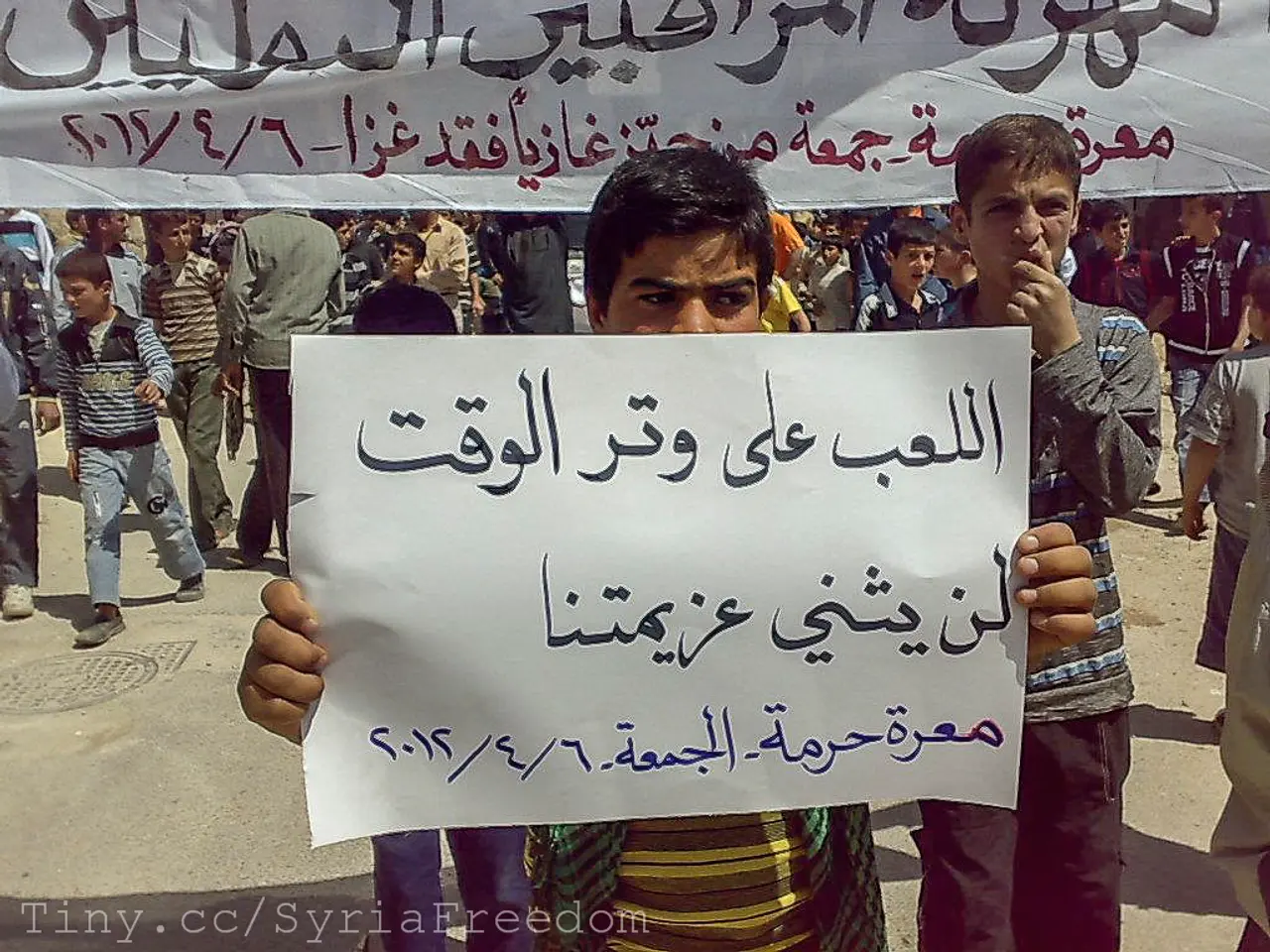Demonstration Arrests Justified: Yvette Cooper Defends Over 500 Arrests at Palestine Action Protests
In a move that has sparked widespread controversy, the UK government proscribed Palestine Action as a terrorist organisation in July 2025. The decision, primarily justified by the group's involvement in violent direct actions, has led to over 500 arrests of protesters supportive of Palestine Action.
The Home Office cited Palestine Action's involvement in incidents such as breaking into RAF Brize Norton military base and damaging military aircraft, as well as the use of weapons, smoke bombs, and actions causing panic and major criminal damage to national security infrastructure. The proscription was carried out under Section 13 of the Terrorism Act 2000, with clear security assessments and advice supporting the decision.
The Home Secretary, Yvette Cooper, defended these arrests, emphasising the difference between lawful protest about Palestine and supporting an organisation legally designated as terrorist due to its activities. However, the decision has been widely criticised.
Human rights organisations, including Amnesty International, have condemned the arrests as disproportionate, noting the peaceful nature of many protests. The UN Human Rights Chief has argued that the proscription is a misuse of counter-terrorism laws, as property damage alone should not qualify as terrorism. Some UK MPs and legal experts view the proscription as a distortion of terrorism, as Palestine Action does not advocate violence against persons but focuses on direct action against military suppliers and infrastructure.
Critics argue that branding a protest activist group as terrorist stretches the terrorism label beyond internationally accepted norms, risks criminalising legitimate dissent, and may infringe on civil liberties and free speech rights. This conflict has led to significant public debate and mass arrests of supporters under terrorism laws.
Sir Keir Starmer's spokesman stated that Palestine Action was proscribed based on "strong security advice" from a "wide range" of experts across government, the police, and security services. Palestine Action co-founder Huda Ammori claimed that the home secretary's statement that Palestine Action is a violent organisation is false and defamatory.
It is important to note that the majority of those arrested were elderly individuals, with around half being aged 60 and above, and almost 100 being in their 70s. This has raised concerns about the application of UK terrorism definitions and their potential impact on free speech.
The Met Police stated this was the largest number of arrests related to a single operation in at least the past decade. The spokesman for Defend Our Juries, former government lawyer Tim Crosland, stated that Yvette Cooper will continue to defend the arrests of people protesting against the atrocities in Gaza.
This issue continues to be a topic of intense debate, with both sides presenting valid arguments. As the situation evolves, it is crucial that the UK government ensures its actions align with international norms, uphold civil liberties, and promote peaceful dialogue.
References: 1. BBC News. (2025). Palestine Action proscribed as terror group by UK government. [online] Available at: https://www.bbc.co.uk/news/uk-61304013 2. The Guardian. (2025). Palestine Action proscribed as terror group by UK government. [online] Available at: https://www.theguardian.com/uk-news/2025/jul/01/palestine-action-proscribed-as-terror-group-by-uk-government 3. Sky News. (2025). Palestine Action proscribed as terror group by UK government. [online] Available at: https://news.sky.com/story/palestine-action-proscribed-as-terror-group-by-uk-government-12513685 4. The Independent. (2025). Palestine Action proscribed as terror group by UK government sparks outrage. [online] Available at: https://www.independent.co.uk/news/uk/home-news/palestine-action-proscribed-terror-group-uk-government-b2140385.html 5. Amnesty International. (2025). UK: Proscription of Palestine Action as a terrorist group is a threat to freedom of expression. [online] Available at: https://www.amnesty.org/en/latest/news/2025/07/uk-proscription-of-palestine-action-as-a-terrorist-group-is-a-threat-to-freedom-of-expression/
In the wake of the UK government's decision to proscribe Palestine Action as a terrorist organization, there has been a heated debate about the application of terrorism definitions, with concerns raised over its potential impact on free speech and the criminalization of legitimate dissent. Critics argue that the proscription could stretch the terrorism label beyond internationally accepted norms and infringe on civil liberties, while human rights organizations such as Amnesty International condemn the mass arrests as disproportionate. This controversy has become a significant political and general-news issue, as well as a matter of crime-and-justice concern due to the widespread arrests and the use of terrorism laws.





